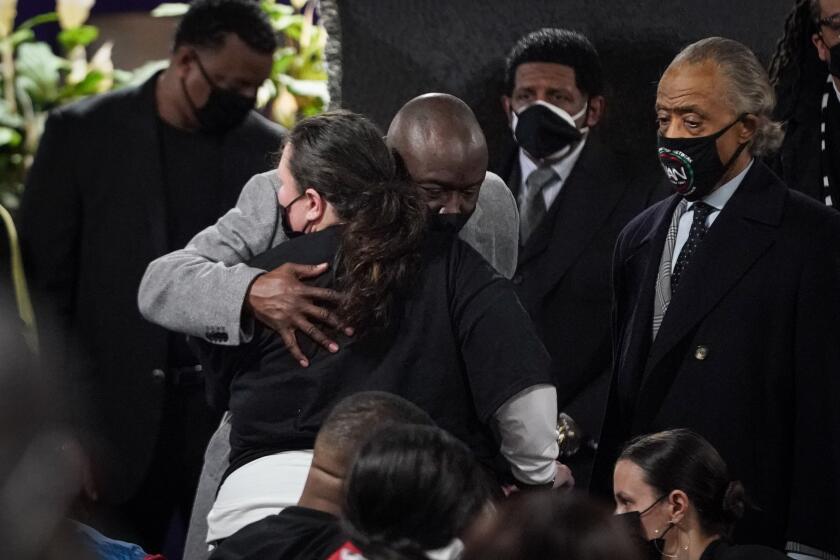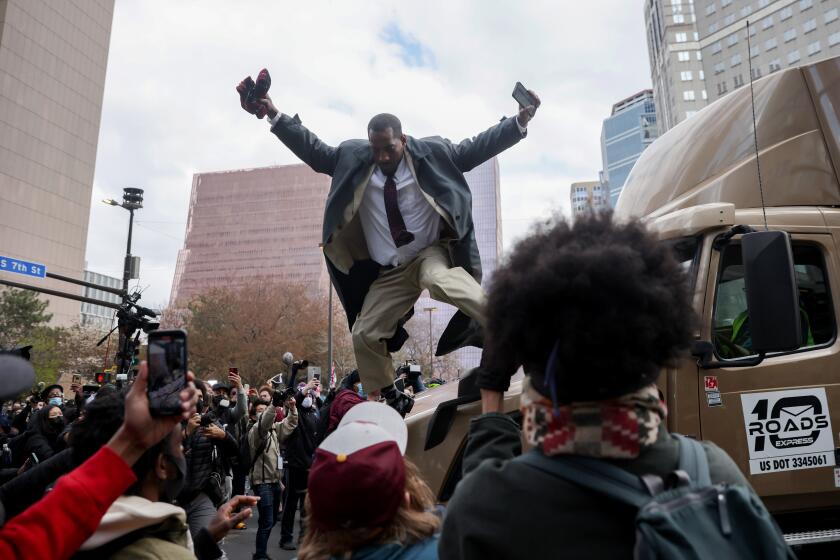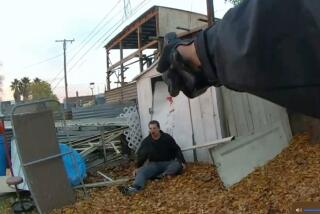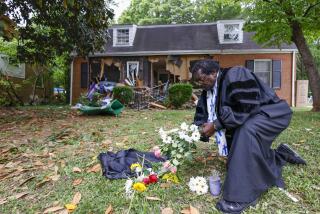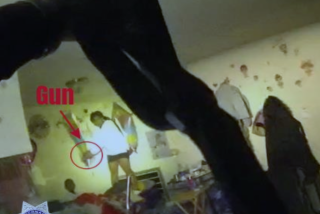Andrew Brown was shot 5 times by North Carolina deputies, pathologist says
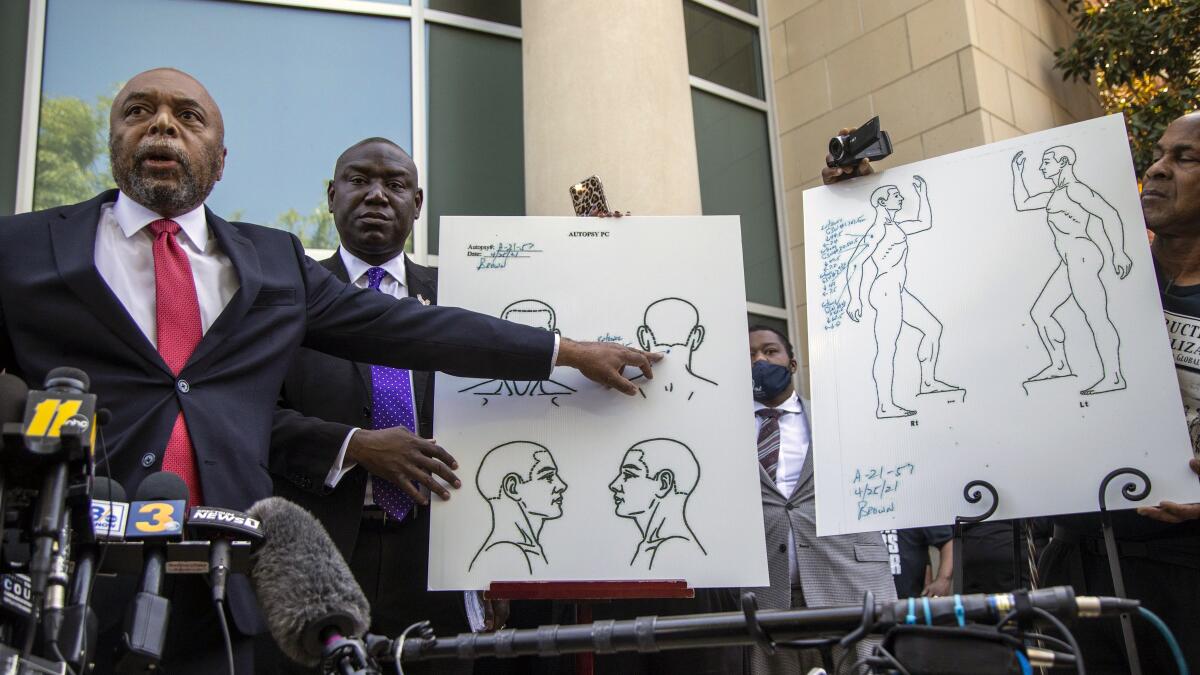
- Share via
ELIZABETH CITY, N.C. — Andrew Brown Jr., a Black man killed by deputies in North Carolina, was shot five times, including in the back of the head, according to an independent autopsy report released Tuesday by his family’s attorneys.
Also Tuesday, the FBI announced a federal civil rights investigation into last week’s shooting of Brown by sheriff’s deputies serving drug-related search and arrest warrants. The developments come amid increasing calls for the release of body-camera video, including formal petitions to make the video public that will be considered by a judge Wednesday.
The autopsy was performed Sunday by a pathologist hired by Brown’s family. The exam noted four wounds to the right arm and one to the head. The state’s autopsy has not been released.
The family’s lawyers also released a copy of the death certificate, which lists the cause of death as a “penetrating gunshot wound of the head.” The certificate, signed by a paramedic services instructor who serves as a local medical examiner, describes the death as a homicide.
Brown was shot April 21 by deputies at his house in the North Carolina town of Elizabeth City, about 160 miles northeast of Raleigh.
Daunte Wright funeral comes days after Derek Chauvin’s conviction for murdering George Floyd.
The autopsy results came a day after Brown’s relatives were shown a 20-second clip of video from one deputy’s body camera. Family lawyer Chantel Cherry-Lassiter, who viewed the video, said Monday that officers opened fire on Brown while he had his hands on the steering wheel of a car. She said the video showed Brown trying to drive away but posing no threat to officers.
Brown’s son Khalil Ferebee questioned why deputies opened fire.
“Yesterday I said he was executed. This autopsy report shows me that was correct,” he said Tuesday at a news conference. “It’s obvious he was trying to get away. It’s obvious. And they’re going to shoot him in the back of the head?”
The pathologist, North Carolina-based Dr. Brent Hall, noted a wound to the back of Brown’s head from an undetermined distance that penetrated his skull and brain. He said there was no exit wound.
“It was a kill shot to the back of the head,” family attorney Benjamin Crump said.
Two shots to Brown’s right arm penetrated the skin. Two other shots to the arm grazed him. The pathologist could not determine the distance from which they were fired.
The shooting prompted days of protests and calls for justice and transparency. Pasquotank County Sheriff Tommy Wooten II has said multiple deputies fired shots but released few details about what happened. Seven deputies have been placed on leave while the State Bureau of Investigation looks into the shooting.
The FBI announced that its Charlotte, N.C., field office had opened the civil rights investigation into Brown’s death, saying its agents will work closely with federal prosecutors and the Department of Justice “to determine whether federal laws were violated.”
Reaction to verdict in death of George Floyd
Wednesday’s court hearing on the video will consider petitions to release it, including filings by a media coalition and by the county attorney on behalf of the sheriff.
A North Carolina law that took effect in 2016 allows law enforcement agencies to show body-camera video privately to a victim’s family, but it generally requires a court to approve any public release.
It’s unclear how soon a judge could rule or how quickly the video would be released if the release is approved. In similar cases, it sometimes has taken weeks for the full legal process to play out.
The slow movement has prompted an outcry from protesters, the family’s lawyers and racial justice advocates, who noted that law enforcement agencies in other states have moved faster. In Columbus, Ohio, the day before Brown was shot, body-camera video was released within hours of an officer fatally shooting a 16-year-old Black girl who was swinging a knife at another girl.
Democrats in the North Carolina General Assembly filed a measure this month proposing that body-camera video be released within 48 hours unless a law enforcement agency asks a court to delay its distribution. But the legislation faces long odds with the Republican Party controlling both chambers of the Legislature.
A key GOP legislator, state Sen. Danny Britt, said in a statement that Republican lawmakers are open to considering improvements to the current law. But with the court hearing set for Wednesday, he said, the process has had little time to unfold.
“It would seem very early, then, to label as broken a process that just began,” Britt said.
More to Read
Sign up for Essential California
The most important California stories and recommendations in your inbox every morning.
You may occasionally receive promotional content from the Los Angeles Times.
